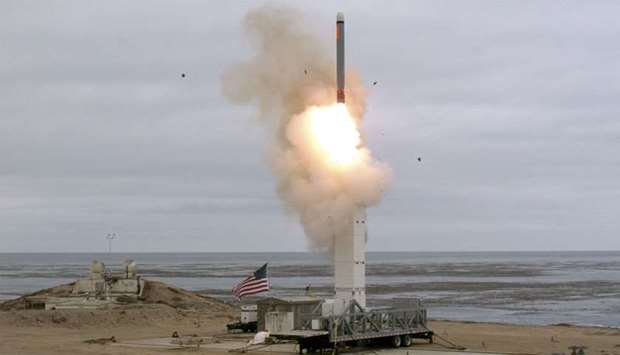Russia's top diplomat charged on Tuesday that a US cruise missile test this week proved that the United States had been violating a bilateral nuclear arms pact.
The ground-launched cruise missile, which the US Defence Department said hit a target more than 500 kilometres away, would have certainly been a violation if it had been launched before the Intermediate-Range Nuclear Forces (INF) Treaty expired just three weeks ago.
Russian Foreign Minister Sergei Lavrov alleged that it would have taken a year to prepare for the missile launch, before the time that US National Security Advisor John Bolton visited Moscow in October 2018 to warn of the US withdrawal from the treaty.
Referring to the date that the treaty expired this month, Lavrov told reporters: ‘This was prepared long ago, long before August 2. It must have been known already in October last year, when John Bolton came to us.’
A senior Russian lawmaker expressed a similar sentiment, saying the missile launch ‘confirmed once again that the United States violated the accord when it was still valid,’ according to comments carried by state news agency TASS.
‘It would have been impossible to conduct the research’ to make such a missile during only the past three weeks, from August 2 to the launch on August 19, said Konstantin Kosachev, chairman of the Russian upper house of parliament's foreign affairs committee.
The US initiated the withdrawal from the decades-old treaty on an allegation that Russia had violated it with the production of a ground-launched cruise missile capable of reaching the banned range of 500 to 5,500 kilometres.
The test ‘confirms once again that the US dismantled the accord not because Russia violated it, but because it prevented the Americans from reaching the final stage in accomplishing their mythical, obsessive goal of achieving unilateral and exceptional military superiority,’ Kosachev said.
The cessation of the treaty, initially clinched between the US and the Soviet Union, Russia's predecessor state, in 1987, came as the two former Cold War rivals observe a rising China and reconsider their military postures.
The US has begun to describe its global defence strategy in terms of renewed competition between the great powers, with a wary eye on both Russia and China, which have strengthened their alliance in recent years amid deteriorating relations with the West.
The move has primarily been a blow for European security, given the range of the missiles affected by the INF treaty, as the agreement was originally designed to reduce competition on the continent in the final years of the Cold War.
Last year Russia said it test-fired a ground-launched missile from a site south of the Ural Mountains to hit a target about 6,000 kilometres away in Russia's far-eastern Kamchatka region, just beyond the treaty's banned range.
Russian President Vladimir Putin warned at the time that the hypersonic missile, the Avangard, is ‘impervious to current and future air-defence and missile-defence systems of a potential enemy.’

